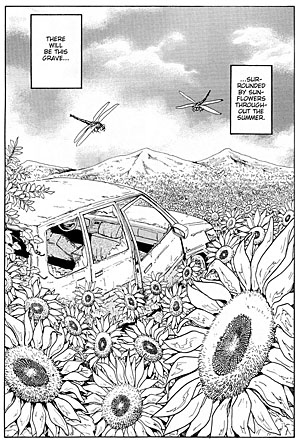Writer and Artist: Takashi Murakami
NBM Publishing (vol. 1), 2011
(The review is based on the Italian editions of the volumes, published from Edizioni BD)
It starts with two corpses. One belongs to a man, the other to a dog. The first has been dead for one year, the second for a few months. Lost in the middle of a field of sunflowers, the policemen know it might be difficult for them to move the car the man’s body is lying inside. It might need time to finally get rid of the rusty vehicle. Whatever happened there, anyway, seems to be impossible to unravel, as the man was carrying no identification. A mystery, then, that only Takashi Murakami can explain via the use of flashbacks.
Stargazing Dog is not just a graphic novel. To state the contrary, that indeed it is, would be to forget that a novel requires two things: length and structure. What this manga is, then, is an impeccable series of short stories which are all intertwined and work flawlessly to create a mosaic that will not let us put it down unless we need time to cry or to make sure that the painful sadness we are feeling does not overcome us completely.
No mistakes are to be made, then: this collection of stories knows how to touch us. Once we reach the end of each of them, we are left wondering if life (that is, real life) can be so harrowing. Yet, that feeling of emptiness is counterbalanced by the depth of the universal greatness of insignificance. We are nothing if compared to the cosmos, our existence a fleeting speckle of nothingness, yet our own presence, our own life (our story or, plural, stories) can mean the world if we manage to create a bond with other creatures, be they men and women, be they animals. Dogs, for instance.

By taking the point of view of different characters and by lending a voice to those who usually have none, Mr Murakami manages to change our own perspective in regards to their own surroundings. The man who talks to his dog, when nobody is around, can tell secrets that usually go unnoticed or that must be kept under lock, lest our own image ends up shattered. Who we are, then, depends on the actions we take and the context that’s been leading us to that moment. Prejudice equals making a mistake, not because we are all good people in the end (some characters in the manga are downright negative, such as the little boy’s mother), rather because before passing any kind of judgement we, as a theoretical jury, need to know how and why that action came to be.
Divided into two books, the first presents two chapters revolving around the main story of the man found dead at the beginning. Narrated through the point of view of the dog, called Happy, we are shown the steps that led to the death of both protagonists, right to an epilogue that can be interpreted either as a dream sequence or as an actual event (in the first case, the overall sadness of the story will increase dramatically). Mr Murakami then continues the story taking the point of view of another man, whose mission is to find out what the name of the corpse is, so that his remains can be sent back to his family; this serves as a coda, allowing us to recover from the emotional whirlwind of the main story.
In the second book, Mr Murakami focuses once again on secondary characters, manipulating time so that the events here narrated are linked with the main story. This allows us not only to expand the universe the stories are set in, it also grants us the chance to have a better conclusion to the overall story, creating a tighter structure. The end result is such that we feel we are part of a larger story while, at the same time, we are part of a closely knit community of people who don’t know each other yet they are interconnected.
Books of this kind are to be judge with a clear and cold mind. Tricks can be played, indeed, and it is possible to find out that what makes us cry at first lacks consistency under close scrutiny. Luckily, this is not the case; if Stargazing Dog manages to move us, to make us feel sad and happy at the same time (a feeling we should all strive to avoid due to the devastating effect it can have on us, a sublimity that can easily destabilise us), this is due to the fact Mr Murakami refuses to create a work of art where cheap tricks are played. The story, having not only an intelligent structure, is based on emotions and events we can all easily relate to, no matter the geographical distance, our age or even our background. And this, all things considered, is the mark of being in front of a work of art; there is no saccharine, here, only the basic elements of an everyday pathos.


